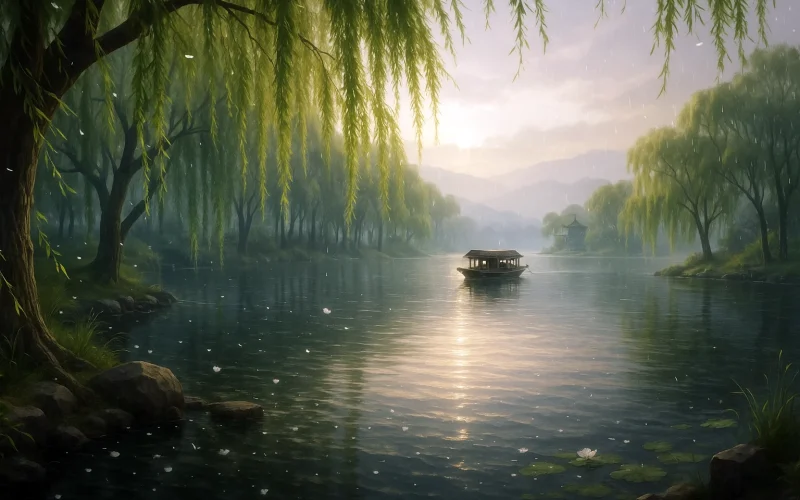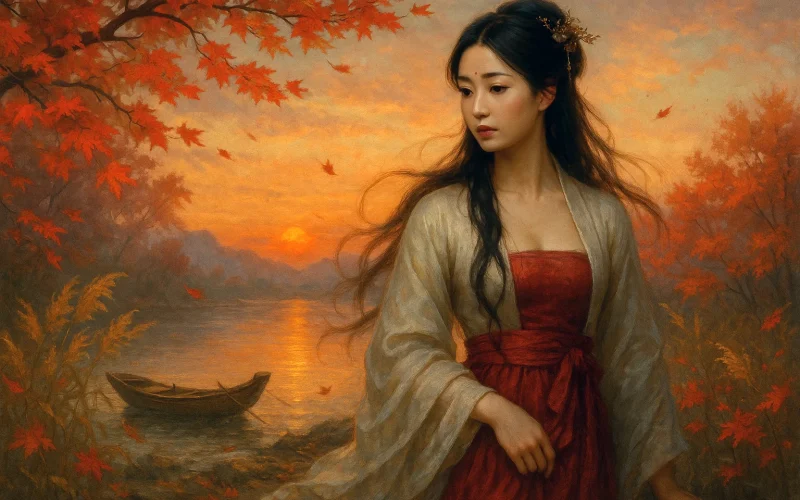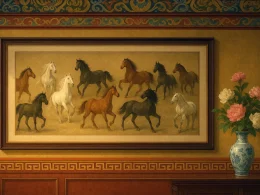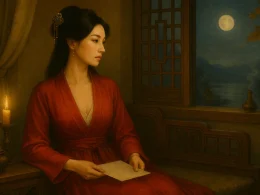All eyes see willow down in the east wind flying,
Urging the traveler to leave at dusk of spring.
Fallen flowers float on water, grass melts into the sky,
The Farewell Shore breaks my heart when waves say goodbye.
The song’s unfinished, but the singer’s gone.
a boat’s half-hidden where green willows hang down.
How hard to bid adieu with a golden cup in hand!
What can I do with orioles’ cries and rain on the sand?
Original Poem
「夜行船 · 满眼东风飞絮」
欧阳修
满眼东风飞絮。催行色、短亭春暮。
落花流水草连云,看看是、断肠南浦。
檀板未终人去去。扁舟在、绿杨深处。
手把金樽难为别,更那听、乱莺疏雨。
Interpretation
Likely composed during Ouyang Xiu's tenure as a regional official, this parting lyric transforms vernal decay into a symphony of separation. Through layered imagery of drifting catkins and fading blossoms, the poet crafts an ecological elegy for human departure, where nature's transitions mirror the irrevocability of farewell.
First Stanza: "满眼东风飞絮。催行色、短亭春暮。"
Mǎn yǎn dōng fēng fēi xù. Cuī xíng sè, duǎn tíng chūn mù.
The east wind fills our eyes with drifting down—
These urgent messengers
Hastening departure
At roadside pavilion
Where spring bleeds
Into dusk.
The stanza opens with kinetic overload: "fills our eyes" (满眼) creates visual saturation with willow floss (飞絮), nature's own restless wanderers. The "roadside pavilion" (短亭), a transient architectural marker, becomes a chronotope where seasonal time (春暮) and human schedules (行色) fatally intersect. The wind emerges as both natural phenomenon and cosmic timekeeper.
Second Stanza: "落花流水草连云,看看是、断肠南浦。"
Luò huā liú shuǐ cǎo lián yún, kàn kàn shì, duàn cháng nán pǔ.
Petals drown in streams,
Grass merges with clouds—
Behold now
The heartbreak ford
Of southern shores.
Here, hydrological and atmospheric elements conspire in dissolution: falling blossoms (落花) become aquatic casualties, while terrestrial grass (草) evaporates into celestial vapor. The legendary "southern ford" (南浦), a literary topos for parting since Jiang Yan's "Farewell Fu," materializes as the final station where geography and grief become indistinguishable.
Third Stanza: "檀板未终人去去。扁舟在、绿杨深处。"
Tán bǎn wèi zhōng rén qù qù. Piān zhōu zài, lǜ yáng shēn chù.
Sandalwood clappers
Still mid-beat
As he departs—
His skiff already
A green willow's
Secret.
The abrupt silence of unfinished music (檀板未终) mirrors the rupture of separation. The "green willow's secret" (绿杨深处) performs botanical concealment—nature swiftly reclaiming human traces, its foliage erasing the departure path like tide smoothing footprints on sand.
Fourth Stanza: "手把金樽难为别,更那听、乱莺疏雨。"
Shǒu bǎ jīn zūn nán wéi bié, gèng nà tīng, luàn yīng shū yǔ.
Golden cup clenched
Against farewell's impossibility—
Then come the orioles'
Disordered refrains,
The sparse rain's
Indifferent notation.
The ceremonial wine vessel (金樽), symbol of communal bonding, now accentuates isolation. Nature's dissonant chorus—birdsong without melody (乱莺), rain without rhythm (疏雨)—composes an anti-elegy, its random patterns mocking human attempts at meaningful closure.
Holistic Appreciation
Centered on a late spring farewell, this lyric poem intricately weaves natural imagery—floating catkins, falling blossoms, flowing water, green grass, willow branches, drizzling rain, and orioles' songs—to evoke the poignant melancholy of parting. The first stanza captures the bittersweet beauty of the season intertwined with the sorrow of departure, while the second shifts to the farewell banquet and the boat's departure, heightening the emotional weight of separation. Though the scenery is picturesque, it is tinged with desolation, creating a profoundly mournful atmosphere. The poet masterfully blends scene and sentiment, rendering the complex emotions of farewell with delicate precision—reluctance, helplessness, and quiet resignation—making this a masterpiece among parting poems.
Artistic Merits
Ouyang Xiu employs a rich tapestry of natural imagery in this lyric, intensifying the emotional resonance of parting through dynamic contrasts. The language is exquisitely concise, balancing vivid depictions of late spring with profound psychological insight. Elegant classical motifs—"east wind's drifting catkins," "fallen petals on flowing water," "chaotic orioles in sparse rain"—reflect the refined freshness characteristic of Song dynasty lyrics. The poem flows with natural rhythm, its structure clear yet layered, using subtle details to reveal intricate emotions. By fusing scenic beauty with sorrow, the work achieves both aesthetic allure and deep emotional resonance, showcasing the poet's exceptional artistry.
Insights
This poem demonstrates how meticulous natural imagery can amplify inner emotions in literary creation, particularly when portraying complex states like parting grief. The interplay of scene and sentiment dramatically enhances expressive power. Meanwhile, the recurrence of motifs—woven into a cohesive whole—strengthens the work's artistic impact, revealing structural ingenuity. It reminds us that even universal themes like farewell can yield fresh and profound effects through multi-faceted, nuanced treatment. The technique of "scene-emotion fusion" (情景交融) remains an enduringly effective path to conveying truth and beauty.
About the Poet

Ouyang Xiu (欧阳修, 1007 - 1072), a native of Yongfeng, Jizhou (present-day Jiangxi Province), emerged as the preeminent literary figure of the Northern Song Dynasty. After attaining the jinshi degree in 1030, he spearheaded a literary reform movement that rejected the ornate Xikun style prevalent at court. As a mentor who nurtured literary giants like Su Shi and Zeng Gong, he laid the foundation for the golden age of Northern Song literature. Recognized as one of the "Eight Great Prose Masters of Tang and Song," Ouyang stands as the pivotal figure in the transformation of Northern Song literary culture.












